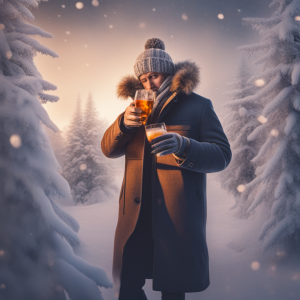Explore the Hidden Risks of Alcohol Consumption in Freezing Temperatures
As we face the harsh conditions of winter, particularly in extremely cold climates, our instinct to find warmth often leads to the tempting but dangerous practice of consuming alcohol. It is essential to fully understand the significant risks that come with this behavior. This article aims to shed light on the serious dangers of drinking alcohol in icy environments, emphasizing that this practice is not only risky but also ineffective in helping maintain body warmth. By enhancing your awareness of these dangers, you can make safer, more informed decisions that prioritize your health and well-being during the perilous winter months.
Before delving into the dangers, it’s important to dispel the common misconception that alcohol serves as a warming agent. When consumed, alcohol triggers dilation of blood vessels near the surface of the skin, creating a misleading sensation of warmth. While this feeling may provide temporary comfort, it fails to meet the critical need for maintaining a stable internal body temperature. In reality, the impact of alcohol can be harmful, impairing your body’s ability to withstand frigid temperatures and significantly increasing the risk of severe conditions such as hypothermia and other serious health problems.
 One of the primary hazards of consuming alcohol in freezing environments is the elevated risk of dehydration. Alcohol is known to act as a diuretic, which increases urine production and leads to significant fluid loss. Additionally, the cold air typical of winter conditions is often drier, which accelerates moisture loss from our bodies. Together, these factors can result in dangerously low levels of hydration, which are critical for maintaining overall health and survival. Dehydration not only negatively impacts physical performance but also affects cognitive functions, making it challenging to think clearly and make sound decisions in critical situations.
One of the primary hazards of consuming alcohol in freezing environments is the elevated risk of dehydration. Alcohol is known to act as a diuretic, which increases urine production and leads to significant fluid loss. Additionally, the cold air typical of winter conditions is often drier, which accelerates moisture loss from our bodies. Together, these factors can result in dangerously low levels of hydration, which are critical for maintaining overall health and survival. Dehydration not only negatively impacts physical performance but also affects cognitive functions, making it challenging to think clearly and make sound decisions in critical situations.
Understand How Alcohol Impairs Your Judgment and Awareness in Extreme Cold
Another significant consequence of alcohol consumption is its ability to impair cognitive function and decision-making skills. In survival situations, the ability to make clear and rational choices is vital for ensuring safety. Alcohol can cloud judgment, making it increasingly difficult to respond appropriately to potential hazards. This diminished capacity for reasoning can lead to accidents and poor decisions, particularly in the face of extreme cold. Maintaining awareness and vigilance of one’s surroundings is essential; however, alcohol compromises this necessity, increasing the likelihood of errors that could endanger personal safety.
Furthermore, alcohol disrupts the body’s natural regulation of temperature. Upon consumption, it causes blood vessels in the skin to expand, leading to an increased loss of heat. Initially, this may create a fleeting sensation of warmth, but over time it accelerates the loss of core body heat, which is essential for survival. This creates a dangerous cycle where the temporary warmth leads to a rapid decline in core temperature, ultimately heightening the risk of life-threatening conditions such as hypothermia. It’s crucial to recognize that while alcohol may seem to provide quick relief from the cold, it ultimately increases vulnerability to severe cold-related health issues.
Recognize the Critical Connection Between Alcohol Use and Hypothermia Risk
When examining the threat of hypothermia, it’s essential to understand how alcohol consumption can mask the early warning signs of this life-threatening condition. Hypothermia occurs when the body's core temperature drops below the normal range, typically below 95 degrees Fahrenheit (35 degrees Celsius). Symptoms can include shivering, confusion, fatigue, and impaired coordination. However, alcohol can dull the body’s natural responses, making it more challenging to recognize these critical indicators. By the time the symptoms of hypothermia become noticeable, it may already be too late to effectively prevent serious injury or even fatalities.
In winter survival situations, there are numerous safer and more effective alternatives to alcohol for maintaining warmth. Here are several strategies that can significantly enhance your ability to stay warm and safe:
1. Dress in Layers for Maximum Warmth: Wearing multiple layers of clothing is essential for effectively trapping warm air. Start with thermal base layers, incorporate insulating mid-layers, and finish with a windproof and waterproof outer layer to create a protective barrier against the cold.
2. Keep Your Clothing and Footwear Dry: Moisture can lead to rapid heat loss, so it’s crucial to keep your clothing and footwear dry at all times. Opt for waterproof materials and change into dry garments whenever necessary to help maintain warmth.
3. Insulate Yourself from the Cold Ground: Utilizing sleeping mats or insulation pads can significantly reduce heat loss, especially during rest periods. This step is vital for conserving body heat during extended exposure to cold environments.
4. Choose Warm, Non-Alcoholic Beverages: Instead of alcohol, consider enjoying hot drinks like tea, coffee, or hot chocolate. These beverages provide warmth without the negative side effects associated with alcohol consumption.
5. Seek or Construct Shelter for Protection Against the Elements: Actively finding or building a shelter can greatly reduce exposure to harsh winds and freezing temperatures. A well-constructed shelter is crucial for retaining body heat, significantly boosting your chances of staying warm.
6. Fuel Your Body with High-Calorie Foods: Consuming nutrient-rich foods that are high in calories can provide your body with the energy needed to produce heat. Foods like nuts and fatty fish are excellent sources of healthy fats that can be particularly beneficial in cold weather.
Developing a comprehensive understanding of the dangers associated with alcohol consumption in freezing temperatures is essential for anyone involved in winter survival scenarios. Despite the fleeting sensation of warmth, alcohol can lead to dehydration, impaired judgment, disrupted temperature regulation, and can obscure the symptoms of hypothermia. By avoiding alcohol and embracing safe, effective strategies, we can significantly improve our chances of surviving and thriving in extreme winter environments. Stay vigilant, prepare thoroughly, and prioritize your safety above all else.
The post Hazards of Alcohol Consumption in Extreme Cold Conditions appeared first on Survival Bite.
The Article Alcohol Consumption Hazards in Extreme Cold Conditions Was Found On https://limitsofstrategy.com
The Article Alcohol Consumption Risks in Severe Cold Weather First Appeared ON
: https://ad4sc.com


I found your article very thought-provoking, especially given how the winter season often lends itself to social gatherings around warm fires where alcohol is frequently present. It’s interesting how our brains can sometimes trick us into believing that we are feeling warmer due to that temporary flush of heat, when in reality, the alcohol is making us more vulnerable to the cold. I remember a few winters back when I went skiing with friends. After a long day on the slopes, we gathered in a cabin, and it felt only natural to crack open a few beers. While I enjoyed the moment, I didn’t think about how that made me more susceptible to the chill once I stepped outside, even for just a moment.
It’s fascinating how those cozy moments around the fire can easily blur the lines between comfort and vulnerability. Your skiing experience really paints a vivid picture of that duality—having fun and unwinding while potentially setting ourselves up for a colder reality outside.
“I’m glad you found the article thought-provoking! If you’re interested, check out this link to explore more about the effects of alcohol on our bodies in colder weather.”
https://lodspeakr.org/webilaro
This article raises a crucial point that often gets overlooked during the winter months. The cultural narratives around alcohol often portray it as a comforting source of warmth; however, the physiological effects reveal a much different reality. I recall a few winters ago when I participated in a snowy outdoor event where hot beverages, including spiked drinks, were abundant. Many friends justified their choices by saying they were battling the cold, but I witnessed several instances where that quick “boost” led to poor decision-making and a disregard for personal safety in those frigid temperatures.
This topic is both timely and crucial as we navigate the chill of winter. I appreciate how you’ve highlighted the misconceptions surrounding alcohol consumption in freezing temperatures. It’s a point I’ve often pondered, particularly during the holiday season when gatherings often involve warm drinks, which can lull us into the false sense of security that we’re protecting ourselves from the cold.